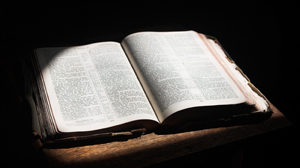Scripture:
Deuteronomy 4:1, 5-9
Matthew 5:17-19
Reflection:
Six years ago, a Filipino medical doctor who practices in a neighboring city requested permission to erect a monument of the Ten Commandments on Saint Ann’s Basilica grounds. I came to learn that he and a rather large group of medical professionals in the area were part of a larger movement to place such monuments in as many places as possible. When asked the purpose of it, he explained that the donor of these monuments lived a rather questionable life. He experienced a profound conversion to a life of faith and charity. His new life revolved around living God’s law as revealed in Jesus. The Ten Commandments symbolized for him this new found freedom and grace. Rather than experiencing God’s law as a hemming in or fencing off, he discovered a new fullness of freedom and love through observance of the law.
As Americans, we may perceive this to be a strange description of living by the law. We tend to experience the law as rather stern measures which direct mostly what we cannot do. Who of us has not rolled through a stop sign at one time or another or made a right turn on red onto a deserted street even though the sign said no turn on red? Who of us haven’t heard it said that as long as you stay ten miles an hour below the speed limit on a highway, you should be fine, i.e. you will not be pulled over? I have a friend who is a Sister and the cook at a nursing home for more than ninety people. She was late one morning and drove to work with great anxiety. It was five in the morning and the streets were absolutely free of traffic so she went through a red light and was stopped by an officer. As he approached the car and saw she was a nun, he said, “Good morning Sister! A little bored with our red lights this morning, are we?” He was a fine Irish officer and said his mother would never forgive him if he gave her a ticket but he did issue a warning citation. We all know that laws create order in a large society. We experience them as rather rigid – yes or no, black or white, legal or illegal. There can be no exceptions, no excuses, and no possibilities of violations without appropriate penalty. Fear of penalty is the operating force behind our understanding of law.
The Scriptural understanding of law is somewhat different. As today’s reading from Deuteronomy reveals to us, God’s law is the source of life and love. The law is God’s invitation to remember the abundance of love that showers down upon His people. They experienced it in the call to become God’s own people through Abraham and Sarah. They found the blessings of that love in their growth as a people and then as a nation. They saw God’s love vividly in the gift of freedom given in the Exodus, and now as they are about to enter the Promised Land. Having experienced God’s love, they are now asked to live that love among themselves. Living the law of God means living according to the mind and heart of God. What is that mind and heart? We see it over and over again when the Chosen People abandon the law and are reminded through the messages of the prophets. Living God’s love means especially a loving generosity for the most vulnerable, the weakest, those without a voice in circles of power, the sick, the very poor. For this reason, we hear so very much about the absolute necessity to take care of the widows, the orphans, and the stranger who comes amongst them. How these are treated will dictate God’s judgment about how well the mind and heart of God is being lived.
This, then, is our Lenten invitation today. Do we understand the message of Jesus in today’s gospel as His invitation for us to live the fullness of the gospel law? Do we understand we are being asked if we are remembering all of the love of Jesus poured out upon us in the gift of redemption and our continuing nourishment in love through the gift of His Body and Blood? Are we living the mind and heart of Jesus, the love of Jesus in our families? In our parishes? In our neighborhoods? In our country? In our world? What is our attitude toward the most vulnerable people of our day? Among others, these might include the disabled, the chronically ill, the elderly poor, the working poor, those without adequate health care, the “strangers” in our land – both documented and undocumented. Are we reflecting the love centered mind and heart of Jesus toward these? Love God and love one another as you would have them love you – this sums up the entire law!!! How are we doing? How am I doing?
Six years ago, I gave my blessing to my Filipino friend. His group came and in one day erected the monument to the ten commandments. It stands as a testament to the outpouring of God’s love upon us all and as a visible manifestation of God’s continuing invitation to live the mind and heart of God with one another in our world. It is the law that gives life and grants freedom to be the sons and daughters of God. May our Lenten graces abound.
Fr. Richard Burke, CP, is a member of St. Paul of the Cross Province. He lives at St. Ann’s Monastery in Scranton, Pennsylvania.
